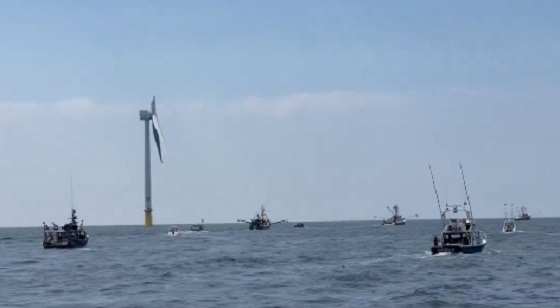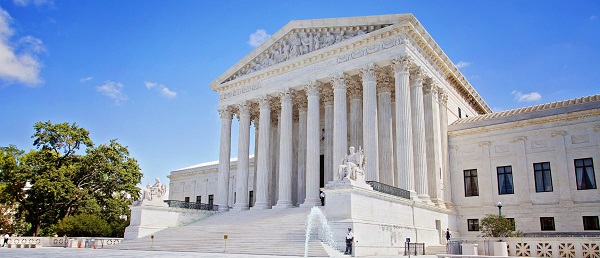Daily Caller
Trump Could Put An End To Biden’s Offshore Wind Vanity Projects


From the Daily Caller News Foundation
By David Blackmon
One of the early decision points to be faced by incoming President Donald Trump will be what to do about the Biden administration’s costly and destructive offshore wind vanity projects in the northeastern Atlantic.
The Biden White House decided to make federal subsidization of and rapid permitting for a growing array of these big industrial installations a top priority early in the administration, and the results thus far have been halting, and in some cases disastrous.
Acting to suspend the installation of hundreds of gigantic wind turbines in the midst of known whale habitats and prime commercial fishing waters is apparently a priority for Trump and his team. Rep. Jeff Van Drew (R.-N.J.) announced on Monday that he has been “working closely” with Trump to draft an executive order that would invoke a 6-month moratorium on offshore wind construction with an eye towards a permanent suspension.
“These offshore wind projects should have never been approved in the first place,” said Van Drew, whose home-state beaches have been littered by dozens of whale carcasses since development began. “The Biden administration rammed them through the approval process without proper oversight, transparent lease agreements, or a full understanding of their devastating consequences. They are an economic and environmental disaster waiting to happen.”
Van Drew characterized the Biden administration’s green new deal agenda as “harmful” and one that put politics over people”, adding, “This executive order is just the beginning. We will fight tooth and nail to prevent this offshore wind catastrophe from wreaking havoc on the hardworking people who call our coastal towns home.”
There can be little question that, in its zeal to fast-track these enormously costly and inefficient wind projects, the Biden regulators essentially abandoned what is known as the “precautionary principle” that the same regulatory agencies have always applied to offshore oil and gas and other major projects in federal waters.
The precautionary principle essentially cautions regulators to act on the adage that it is better to be safe than sorry. It holds that if there is a risk of severe harm to the environment or animal life, an absence of any scientific or conclusive proof is not to be given as the reason for inaction. This principle places the burden of proof on the shoulders of the person who denies their project is harmful.
This principle has been used by federal regulators of the U.S. offshore many times to halt oil-and-gas projects for years at a time so that proper environmental studies can be conducted under governing laws like the National Environmental Policy Act (NEPA) and the Outer Continental Shelf Lands Act (OCSLA).
The Biden White House was only too eager to cite the OCSLA recently to justify a ban on future drilling across 625 million acres of federal waters on the specious reasoning that it was “too dangerous” to allow future generations to enjoy the benefits of the billions of barrels of oil known to lie beneath these waters. This is absurd overkill, but it is also an example of the exercise of the precautionary principle.
But since 2022, as communities from New Jersey up to Maine have raised serious concerns about potential negative impacts by these massive wind industrial projects on sea mammals, seabirds and the region’s commercial fishing industry, Biden’s regulators have tossed the precautionary principle aside.
There is another principle at stake here that Trump should address: The equal and consistent application of U.S. law. It is a principle that the Biden administration chose to abandon in its zeal to enact its green agenda, from the cancellation of the Keystone XL Pipeline to the unjustified LNG permitting pause.
Actions such as these, in which multi-billion-dollar investments are lost based solely on executive whims, make it much harder for company management teams to take on big projects in this country. Who wants to risk billions of capital dollars on any project when it becomes impossible to predict how laws will be applied by future presidents?
President Trump would be wise to place restoration of these two key principles of offshore energy development atop his list of priorities.
David Blackmon is an energy writer and consultant based in Texas. He spent 40 years in the oil and gas business, where he specialized in public policy and communications.
conflict
‘They Don’t Know What The F*ck They’re Doing’: Trump Unloads On Iran, Israel


From the Daily Caller News Foundation
President Donald Trump expressed frustration Tuesday after Iran broke a ceasefire, prompting retaliation from Israel during a gaggle with reporters on the White House lawn.
Trump announced the ceasefire Monday, saying it was supposed to take effect at 1 a.m. Eastern Daylight Time, but Iran fired missiles at Israel Tuesday. Trump vented, saying the countries had been “fighting so long” they couldn’t make peace.
WATCH:
“You know, when I say okay, now you have 12 hours, you don’t go out in the first hour just drop everything you have on them,” Trump said. “So I’m not happy with them. I’m not happy with Iran either. But I’m really unhappy if Israel is going out this morning because the one rocket that didn’t land, that was shot, perhaps by mistake, that didn’t land, I’m not happy about that.”
“We basically have two countries that have been fighting so long and so hard, that they don’t know what the fuck they are doing,” Trump added.
The United States struck facilities in Fordow, Natanz and Isfahan related to Iran’s effort to develop nuclear weapons early Sunday morning local time, using as many as 14 GBU-57 Massive Ordnance Penetrators in the operation, which involved a 37-hour flight by seven B-2A Spirit bombers.
The American strikes came ten days after Israel launched a military operation targeting the Iranian nuclear program. Iran has responded with repeated missile attacks on Israeli cities and a refusal to resume negotiations over its efforts to pursue nuclear weapons.
Automotive
Supreme Court Delivers Blow To California EV Mandates


From the Daily Caller News Foundation
“The Supreme Court put to rest any question about whether fuel manufacturers have a right to challenge unlawful electric vehicle mandates”
The Supreme Court sided Friday with oil companies seeking to challenge California’s electric vehicle regulations.
In a 7-2 ruling, the court allowed energy producers to continue their lawsuit challenging the Environmental Protection Agency’s decision to approve California regulations that require manufacturing more electric vehicles.
“The government generally may not target a business or industry through stringent and allegedly unlawful regulation, and then evade the resulting lawsuits by claiming that the targets of its regulation should be locked out of court as unaffected bystanders,” Justice Brett Kavanaugh wrote in the majority opinion. “In light of this Court’s precedents and the evidence before the Court of Appeals, the fuel producers established Article III standing to challenge EPA’s approval of the California regulations.”
Kavanaugh noted that “EPA has repeatedly altered its legal position on whether the Clean Air Act authorizes California regulations targeting greenhouse-gas emissions from new motor vehicles” between Presidential administrations.
“This case involves California’s 2012 request for EPA approval of new California regulations,” he wrote. “As relevant here, those regulations generally require automakers (i) to limit average greenhouse-gas emissions across their fleets of new motor vehicles sold in the State and (ii) to manufacture a certain percentage of electric vehicles as part of their vehicle fleets.”
The D.C. Circuit Court of Appeals previously rejected the challenge, finding the producers lacked standing to sue.
“The Supreme Court put to rest any question about whether fuel manufacturers have a right to challenge unlawful electric vehicle mandates,” American Fuel & Petrochemical Manufacturers (AFPM) President and CEO Chet Thompson said in a statement.
“California’s EV mandates are unlawful and bad for our country,” he said. “Congress did not give California special authority to regulate greenhouse gases, mandate electric vehicles or ban new gas car sales—all of which the state has attempted to do through its intentional misreading of statute.”
-

 Business1 day ago
Business1 day agoRFK Jr. says Hep B vaccine is linked to 1,135% higher autism rate
-

 Crime2 days ago
Crime2 days agoNational Health Care Fraud Takedown Results in 324 Defendants Charged in Connection with Over $14.6 Billion in Alleged Fraud
-

 Business14 hours ago
Business14 hours agoWhy it’s time to repeal the oil tanker ban on B.C.’s north coast
-

 Censorship Industrial Complex1 day ago
Censorship Industrial Complex1 day agoGlobal media alliance colluded with foreign nations to crush free speech in America: House report
-

 Alberta8 hours ago
Alberta8 hours agoAlberta Provincial Police – New chief of Independent Agency Police Service
-

 Health2 days ago
Health2 days agoRFK Jr. Unloads Disturbing Vaccine Secrets on Tucker—And Surprises Everyone on Trump
-

 Alberta13 hours ago
Alberta13 hours agoPierre Poilievre – Per Capita, Hardisty, Alberta Is the Most Important Little Town In Canada
-

 Business1 day ago
Business1 day agoElon Musk slams Trump’s ‘Big Beautiful Bill,’ calls for new political party

